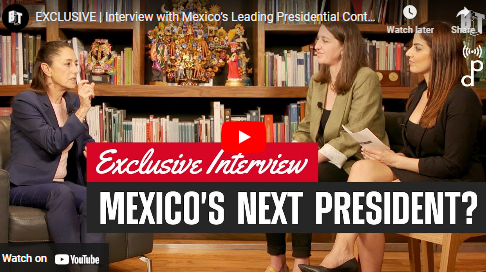In a historic election on Sunday, Mexican voters are poised to elect a woman to lead the country, likely making Claudia Sheinbaum the first female president of Mexico, and possibly the first woman of Jewish ancestry to hold the office. This landmark event will see Mexico achieve this milestone before its northern neighbor, the United States.
Claudia Sheinbaum, a scientist, engineer, and former mayor of Mexico City, is the frontrunner in the three-way presidential race. Sheinbaum shares the populist ideology of her political mentor, current President Andrés Manuel López Obrador. Trailing her in the polls is Xóchitl Gálvez, a businesswoman and former senator, making it highly probable that Mexico will elect a female head of state before the U.S. Jorge Álvarez Máynez is the third candidate in the race.
The implications of this election extend far beyond Mexico. Shannon O’Neil, a senior fellow at the Council on Foreign Relations, emphasized the importance of Mexico’s leadership, stating that developments in Mexico have significant impacts on the United States. This election is particularly noteworthy given the multifaceted and often strained relationship between the two countries.
Mexico plays a crucial role in the U.S. economy, supplying car parts, windmill blades, pacemakers, and avocados, among other goods. Last year, Mexico surpassed China to become the United States’ largest trading partner, with nearly $800 billion in annual trade. However, Mexico is also a transit country for hundreds of thousands of U.S.-bound migrants and the primary source of fentanyl, a drug responsible for many American deaths.
The nature of U.S.-Mexico relations will depend on the next president’s stance towards the United States. A president open to cooperation could help address shared challenges and opportunities, while a more suspicious leader could complicate matters.
What to know about Mexico’s historic elections Sunday that will likely put a woman in power https://t.co/lPcWnfYagv
— The Associated Press (@AP) May 31, 2024
Sheinbaum, leading in the polls by double digits, is seen as a left-leaning idealist who promises to continue López Obrador’s agenda. In a recent rally, she praised López Obrador as Mexico’s best president, denounced neoliberalism, and vowed to continue policies aimed at reducing inequality. These policies include cash transfers to around 25 million Mexicans, targeting the elderly, students, and other groups.
López Obrador’s tenure saw mixed results in U.S.-Mexico cooperation. He reduced security collaboration by withdrawing from the Mérida Initiative, which involved a $1.5 billion U.S. commitment to combat criminal organizations in Mexico. However, he successfully renegotiated the key free trade agreement between the U.S., Canada, and Mexico and partnered with the U.S. to slow migration to the U.S. border.
Mexican voters are primarily concerned with domestic issues such as inflation, economic opportunities, and public safety. This election is the largest in the country’s history, with over 20,000 offices up for grabs. Campaigns have been marred by violence, highlighted by the recent assassination of a mayoral candidate in Guerrero state.
What to know about Mexico’s historic elections Sunday that will likely elect the country’s first female presidenthttps://t.co/2UbVOxnFEp
— CBS 8 San Diego (@CBS8) June 1, 2024
Jennifer Apperti, director of the Texas-Mexico Center at Southern Methodist University, notes that the next administration’s focus will likely be on domestic policy rather than foreign relations. Crime and job creation are top priorities for Mexican voters. Corruption and the demand for drugs in the U.S. have allowed criminal organizations to flourish in Mexico, controlling both the drug trade and legitimate industries like avocado and lime exports.
Gálvez, the second-place candidate, has criticized López Obrador’s security strategy, highlighting the high death toll and disappearances during his term. Many Mexicans, facing violence and weak economic growth, have considered migrating to the U.S. to improve their living conditions.
Despite these challenges, many Mexicans find opportunities within their country, working in assembly plants or the booming tourism industry. The relationship between Mexico and the U.S. remains crucial for both nations’ prosperity. Lorenzo Pacheco, a Sheinbaum supporter, believes that a strong U.S.-Mexico relationship is mutually beneficial. He advocates for increased openness in trade and tourism, emphasizing that as one country grows, so does the other.
Major Point:
- Mexican voters are expected to elect Claudia Sheinbaum, likely the first woman and possibly the first woman of Jewish ancestry, as president, achieving this milestone before the U.S.
- Sheinbaum, a scientist and former mayor of Mexico City, leads a three-way race against Xóchitl Gálvez and Jorge Álvarez Máynez.
- Mexico’s relationship with the U.S. is significant, with nearly $800 billion in annual trade and critical issues such as migration and fentanyl trafficking impacting both countries.
- Sheinbaum promises to continue the policies of current President López Obrador, focusing on reducing inequality and maintaining cash transfer programs.
- Mexican voters are primarily concerned with domestic issues like inflation, economic opportunities, and public safety, with the next administration expected to prioritize these areas.
Conner T – Reprinted with permission of Whatfinger News



